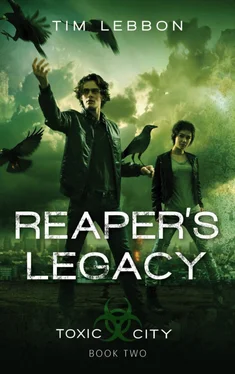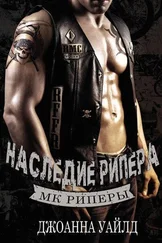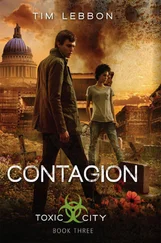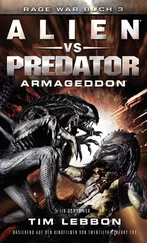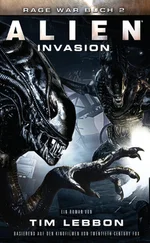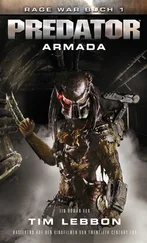“You’re slow,” she said. “Come on. Not long.”
“We’ve got—”
“Got to be quick,” she finished for him. She nodded back at Sparky and the others. “They might only have seconds.”
“But the Choppers have dropped their weapons.” And it was true. The soldiers all looked confused and shaken, probably in the middle of wondering why they had suddenly dropped their machine guns.
“Not all of them,” Fleeter said. “Only the ones he could see.” She nodded up at the surrounding piled containers where they had seen a sniper, and where more might be hiding.
They ran. Across the rough concrete, past the Land Rovers and two vans, and as they approached the larger of the container arrangements Jack had a sudden pang of terror. What would they find inside? He hoped his mother and Emily. But he could not help fearing the worst.
Fleeter paused by a couple of wooden boxes that had been laid to form steps.
“What?” Jack asked.
“Door,” she said, pointing up. The side of the container was swathed in canvas, but a sheet of it was pinned aside, showing the gleaming bottom third of a metal doorway formed in the unit’s wall. “More than meets the eye.”
“You can open it?” he asked.
“Dunno. You got a special finger-shaped-like-a-key power, Jack?”
Jack ignored her and stepped up to the door, shifting the canvas aside and searching for a handle. He found it, pushed down, and was surprised when the door clicked open.
“Oh, that’s careless,” Fleeter whispered. She climbed the boxes to stand close beside him. “We won’t have long. Opening the door will cause a storm inside at their speed, because the pressures will rapidly change. Then they’ll just start shooting.” Fleeter’s previous flippancy had vanished and now she was all seriousness. Jack should have been pleased. But the shock of what was revealed as Jack hauled the door open excluded anything else
The connected units still formed several compartments, with a corridor running along one side. They were staring now into the corridor and the first compartment, and it was an operating theatre. At least that was what Jack thought at first. But closer examination revealed greater, more terrible detail, and it was only Fleeter’s hand against his back that prevented him from tumbling back down the impromptu steps.
Oh no, oh no, oh no , he thought, and the terror of what he saw conjured images that strove to still his heart and steal every ounce of determination and resolve he had. Operating theatres were clean, caring places, their sterile atmospheres filled with good intentions and positive thoughts. There might be blood, but it was quickly mopped up. There would be tools that looked severe and even grotesque, but they would be perfectly, caringly manufactured to make lives better. Not to take lives. Not to torture.
The operating table was a slab of metal with a drainage channel around all four sides, pipes venting into several large plastic containers beneath the table. They were opaque, but Jack could still see that they were half-filled with a dark fluid. Blood also still smeared the table and was splashed across the floor, drying in boot-print patterns. Along the far wall was a metal counter propped on thin legs, and it was scattered with an array of tools. He could make out several saws of varying sizes, heavy knives, scalpels, and a couple of chunky devices with thick springs and wide clamps. Other were beyond identifying. Some of the tools looked all too familiar from his father’s work shed at home, and the room took another leap away from being an operating theatre. This was a dissection suite.
A man dressed in jeans and a canvas jacket was bent over by the head of the table. He was picking something up from the floor and depositing it in a bag, the bag already bulging with other things. He was almost motionless, and the slowness of his movement—as invisible as the shifting minute hand of a clock—gave the scene a strangely fluid property.
Other things in the bag , Jack thought, still struggling to comprehend the awfulness of this, and some of those things could have belonged to Emily or his mother. Because as he stepped inside to get a better view of the torture chamber, he could see the pink fleshiness of the object in the man’s hand.
“We should kill him,” Fleeter breathed, and Jack wanted to, more than anything else right then—more than rescuing his family, if they were still alive; more than doing something good and strong that might help London’s survivors find a safer, calmer future—he wanted to kill this man. But as Fleeter crossed the room, stepping over blood and moving more gracefully than Jack had yet seen, reality hit home.
“Fleeter,” he said, his voice deadened by whatever enabled them to do this. “The girl.”
Jack turned from that awful room and walked along the corridor. It ran the length of the four containers, and he could see three more doors leading off to the right into other, smaller rooms, as well as one at the end. There was also a woman in the corridor. She was pushing her glasses up onto the bridge of her nose, her other hand resting on the door handle closest to Jack as she prepared to enter.
And see what? he thought, heart racing. What are these bastards doing here? But he knew very well. This was vivisection.
He planted his hand on the woman’s chest and shoved her aside. She felt strange to the touch, her chest almost solid, yet not quite mannequin-hard. Her expression did not alter, but as she bounded from the wall and slid along the floor the effect of the impact was dreadful. Her right arm was crushed slowly, violently around her body, shoulder popping, and as her hand glanced from her face her nails opened ugly gashes across her nose and over her forehead. Even though in Jack’s view she moved normally, in her reality the impact would have been impossibly rapid and brutal. He hoped he had not killed her. But he didn’t care enough to check.
Fleeter was behind him as he shoved the handle down on the metal door and shoved it open.
It was a store room. All four walls of the container were lined with shelving, and eighty percent of the shelves contained glass sample jars. They were strapped in for safety. Their contents were not easily identifiable.
“Bastards,” Fleeter said.
“How many people?” Jack wondered. There must have been two hundred jars there. “How can they…?”
“What, justify this?”
Jack nodded, but he already knew the answer. “They don’t have to,” he said. “As far as the world knows, London is filled with monsters.”
“Camp H certainly is,” Fleeter said. “Come on. The girl.”
They stepped over the woman sprawled in the corridor—her expression changing infinitely slowly from mildly distracted, to shocked and agonised—and kicked open the next door. The room was filled with equipment, tools, and a heavily stocked weapon rack. Fleeter grabbed a pistol and several magazines and offered them to Jack, but he shook his head. She raised an eyebrow.
“It wasn’t an invitation,” she said.
Jack took the gun. She pointed briefly at the switch above the trigger. “Safety. And there’s one in the handle, squeeze that when you’re shooting.”
The next room was a bathroom, and then the corridor ended with another door. Fleeter went to kick it open but Jack held up his hand, one finger raised.
He half-closed his eyes and cruised his star-scape of potential, realising even as he tried that he had yet to employ one talent whilst already using another. His awareness of Fleeter and his surroundings diminished, and he probed outwards, projecting his senses through the metal door and into the room beyond. There were three warm sensations in there. Jack closed in and merged his own senses with the first—
Читать дальше
